Regime Insider Slams Tehran’s Sending Of Drones To Russia
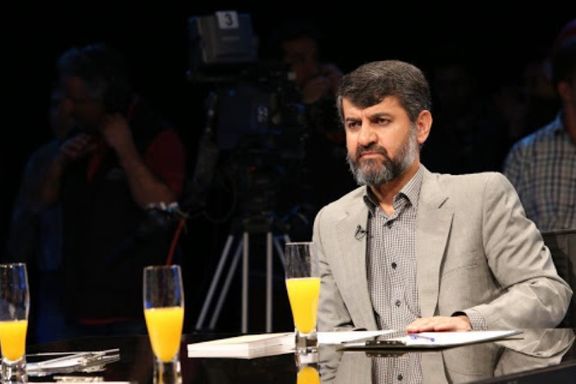
A regime insider and former editor of the conservative flagship Kayhan Daily, has categorically slammed Iran’s support for Russia in the war against Ukraine.

A regime insider and former editor of the conservative flagship Kayhan Daily, has categorically slammed Iran’s support for Russia in the war against Ukraine.
In a debate at Amirkabir University of Tehran, Mehdi Nasiri severely criticized the foreign policy of the Islamic Republic on Sunday, saying that "we supported Putin's disgraceful aggression against a country and gave him weapons".
Despite evidence provided by Ukraine and Western countries, the Iranian officials for months have denied sending drones to Russia.
Finally, last November Foreign Minister Hossein Amir-Abdollahian confirmed the deployment, admitting they were limited in number, and sent before the outbreak of the war in Ukraine.
Ukraine has accused the officials of the Islamic Republic of Iran of "lying" while the European Union and the United States have imposed several rounds of sanctions against the clerical regime for sending drones to be used in the war on Ukraine.
During his debate with pro-regime insider Mehdi Khanalizedh, Nasiri added that "the Islamic Republic has been looking for nuclear weapons" and therefore " the people and economy of Iran suffered billions of dollars of loss."
"We have established an enemy-oriented system and are mainly looking for the creation of enemies. We must go back and make changes, including in foreign policy,” he said.
He further added that like North Korea, the Islamic Republic wants to be “under the nuclear umbrella of Russia", while "this is the worst way", the Russians not trusted on the global stage.

The Islamic Republic's chief banker says strict measures recently introduced on the banking system are aimed at curbing capital flight, claiming they follow international norms.
Mohammad-Reza Farzin, the governor of the Central Bank of Iran (CBI), said on state TV Monday night that "all the countries of the world have regulations to prevent capital flight, and capital flight means that you give rials and receive a foreign currency, and it doesn't matter if you keep this currency at home or, for example, go to Turkey and buy a house with it.”
Farzin avoided issues of transparency, he claimed people can do whatever they want with their money if it is not illegal or considered laundering. To have control over the people’s money, the Islamic Republic has recently announced regulations that push people to open foreign currency accounts in its notoriously corrupt, if not bankrupt banks in Iran instead of getting the foreign currency in cash.
Farzin said pushing people to have long-term foreign currency accounts is a measure to control the currency market, but the owners of these accounts cannot withdraw deposits in the foreign currency and only can get the equivalent in almost worthless rials. On the other hand, Farzin has said that the CBI does not consider the exchange rate to be at the actual rate at which people are buying and selling currencies in the market, and that the government plans to have a cap on the rates. For example, the rate that Farzin had announced for the exchange of dollars is about half of the exchange rate at the market at about 280,000 rials for one dollar, while the current rate is about 510,000 rials.
The cash-strapped regime has been unable to access a large portion of its export revenues due to international sanctions, and has been eying measures to grab money kept by the public in safety deposit boxes or at homes. In April 2022, the country’s Headquarters for Combating Smuggling of Goods and Currency announced that the maximum limit for keeping foreign currencies is $10,000 or its equivalent in other currencies. For any amount more than this limit, people should apply for special permits.

Elsewhere in his remarks, Farzin referred to a suspicious bank heist last year, the biggest in recent history and the shadiest in nature as robbers broke only into safety deposit boxes and were arrested in a matter of days. Farzin said that according to the information obtained from the robbery as well as the data from other safety deposit boxes throughout the country, about $15-16 billion dollars are kept in boxes.
In June 2022, thieves broke into at least 200 to 250 safety deposit boxes in the central Tehran branch of Iran’s largest bank – the state-owned Bank Melli (National Bank). Apparently, the robbers gained access from an adjacent building during a two-day holiday. Four days after the heist, police displayed recovered money and gold and announced the arrest of nearly 30 people allegedly involved in the large bank heist in Tehran. The surprisingly quick reaction and arrests by the police raised eyebrows with many seeing it as an ‘inside job’. In February, Iran’s judiciary said 20 people involved in the robbery have been released on bail.
A few hours before Iran’s chief banker went on state television, a large group of the victims of the burglary held a gathering in front of the bank and protested "10 months of patience is enough, return our property".

While the ban on the entry of women into sports stadiums in Iran continues, Malavan soccer club has requested the presence of female fans.
In a letter to the Bandar Anzali Security Council and the Football Federation on Monday, the club said “the infrastructure of the stadium is suitable for the entry of families and women”, requesting that “their female fans enter the stadium in the 26th week of Iran's premier football league on Saturday.”
On some occasions when a limited number of women have been allowed in stadiums, they were placed in separate sections, not mixing with men but the ban has subsequently led to many arrests, beatings, detentions, and assaults against women.
The request comes amid a government push to enforce hijab on women and a permission to allow them into a stadium would anger hardliners.
The plea comes as the vice president of the football federation announced in February that “until further notice, the infrastructure for the presence of women in the stadiums is not available”.
The international governing body of the football association (FIFA) has tried to convince Iran’s government to lift an unwritten ban on women attending stadiums to watch male players for nearly a decade.
Iranian officials have always argued that male football fans swear profanities, so the atmosphere of stadiums is not suitable for women even if they are seated in a different part of the stadium.
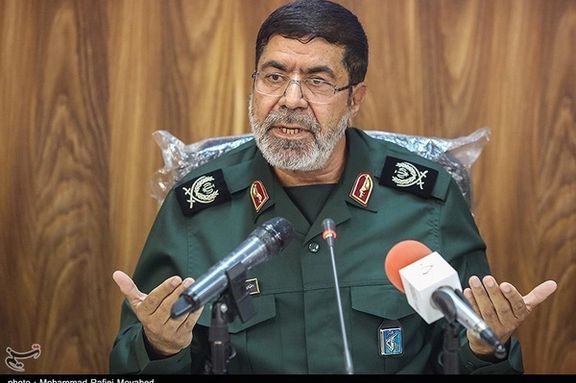
An Iranian IRGC Commander has hailed Palestinian terror groups, claiming 10,000 attacks have been perpetrated against Israelis this year.
Brigadier General Ramazan Sharif, the head of the Intifada and Quds Central Headquarters of the Islamic Propaganda Coordination Council, said on Tuesday that the formation of a unified anti-Israeli front from South Lebanon and the Syrian Golan Heights to Gaza and the West Bank has challenged Israel more than ever. Groups backed by Iran have carried out terror across three of Israel's borders in the last week, in addition to violent unrest in Jerusalem.
"The emergence of young Palestinian resistance groups and the implementation of amazing operations in the West Bank shows the determination of the new generation of Palestine to reclaim their motherland," he said.
He claimed the constitutional crisis in Israel has challenged the hope of many Israelis for survival and alleged “two million residents of the occupied territories are emigrating from Israel, but the Zionists seek to hide this”. He failed to substantiate the wild figure which would be the equivalent of roughly 20% of Israel’s Jewish population, claiming the reverse migration is the impossibility of thinking of a bright future, in ironic echoes of the sentiments felt by the people of Iran.
He announced plans by the Islamic Republic for a 2,500 strong naval parade for civilians to commemorate Quds Day, an annual event held on the last Friday of the Islamic holy month of Ramadan to express support for Palestinians and oppose Israel and Zionism, a region-wide trend begun by the Supreme Leader.
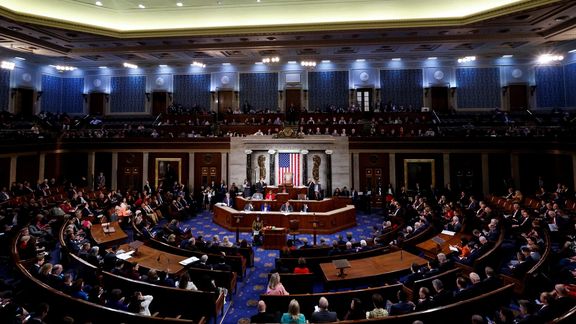
More than 130 Democratic and Republican Congresspeople issued a letter Monday asking the European Union to designate Iran’s IRGC as a terrorist organization.
Referring to the multiple threats the group has posed internationally, including the attempted murder of author Salman Rushdie in the US and a plot to murder ex-Trump aide John Bolton, the group claimed that Iran remains a “leading state sponsor of terror”.
Proscribed by the US in 2019 under the Trump administration, the IRGC has been operating for decades across the EU, most recently, including a plot to murder Iran International journalists in London.
A recent study by the Combating Terrorism Center at West Point showed that in the last five years Iran has instigated at least 33 plots to surveil, abduct, or assassinate citizens in Europe,” members of the US House of Representatives wrote in their letter.
Iranian communities in Europe and North America and several European and EU politicians and officials have been demanding that the EU and its member states should act to proscribe the Islamic Revolution Guard Corps (IRGC) in the aftermath of a deadly crackdown on protesters since September 2022.
Security forces under the command of the IRGC have killed well over 500 civilians during anti-regime protests, seriously injured hundreds of others and arrested more than 20,000. Among the detainees are hundreds of school children, women activists, journalists and artists.
The issue of adding the IRGC to the list of Europe’s terrorist entities became a rallying point for the Iranian diaspora, which launched online campaigns and held a large protest in Strasbourg on January 16 to lobby the European Parliament for passing the resolution.
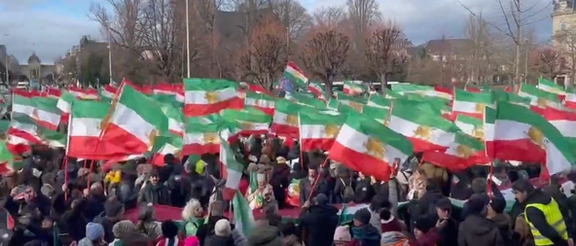
The European Parliament on January 19 overwhelmingly passed a resolution calling on the EU and its member states to designate the IRGC as a terrorist group, but its resolution is not binding for the bloc’s executive bodies.
While several key EU countries, such as Germany and France have been saying they are looking into the matter, the European Union foreign policy chief Josep Borrell has argued that such a step hinges on a legal determination by an EU member state court. However, critics believe the EU does not want to offend the Iranian regime, still hoping to open the way to a nuclear agreement with Tehran.
Congresswoman Kathy Manning (D-NC), Vice Ranking member of the House Foreign Affairs Committee, Chair of the Europe Subcommittee of the House Foreign Affairs Committee and Congressman Bill Keating (D-MA), Ranking Member of the Europe Subcommittee led the bipartisan letter.
The position of the Biden administration on the issue is not clear. There have been reports that Washington has asked the United Kingdom not to designate the IRGC, to keep channels open with Tehran with the hope of reaching a nuclear deal.
The EU and some member states have imposed several rounds of sanctions on Iranian entities and individuals also linked with the Revolutionary Guard in the past seven months, but designating the organization as a terrorist group has not happened.
“We strongly urge you, and your foreign affairs ministerial colleagues, to make the decision to fully sanction, penalize and delegitimize the IRGC, to help prevent them from further threatening democracy and freedom in the United States, Europe, and around the world,” the bipartisan group of lawmakers wrote to Borrell.
When the US designated the IRGC, Iranian negotiators part of the nuclear talks were demanding that the US should reverse its decision. The negotiations that the Biden administration began in April 2021 ended in a deadlock last September and since, the President has stuck by the designation.
In the wake of the collapse, the Islamic Republic has since supplied suicide drones to Russia that have been used against civilian targets in Ukraine, angering European countries and triggering several more rounds of sanctions.
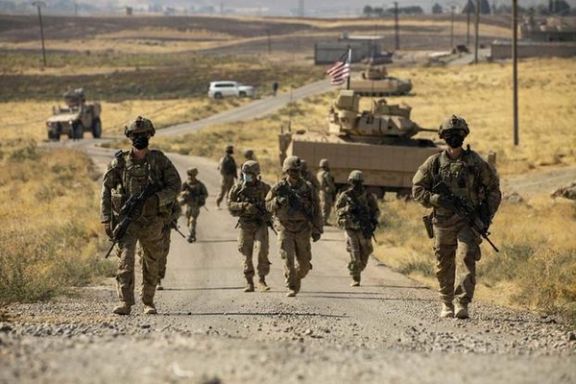
The US military says one of its bases in eastern Syria was targeted by a rocket attack on Monday.
In a statement, the military announced a rocket hit the Mission Support Site Conoco, the US oil company in eastern Syria, and another rocket was found at the attack point of origin, but they did not cause any casualties or damage.
No group has yet claimed responsibility for the attack. However, The Britain-based Syrian Observatory for Human Rights that monitors human rights in Syria suggested Iranian-backed militias may have been behind the attack.
The US forces targeted the positions of groups related to the Islamic Revolutionary Guard Corps in Syria with retaliatory airstrikes in late March.
The operation was a response to a suspected Iran-linked drone attack that killed a US contractor and wounded six other Americans in northeastern Syria.
Estimates show that currently, at least 900 US forces are present in Syria.
In late March, top US defense chiefs faced criticism from the Senate Armed Forces Committee claiming the response to Iranian attacks on US forces is weak and lacks deterrence.
Of 83 attacks in Iraq and Syria since President Joe Biden took office, just four retaliations have taken place.
The weak US approach to Iran has been a thorn in Biden’s side as the Democrats try to keep channels open with Tehran in the hope of reviving the nuclear deal, the JCPOA.